A Fatal Romance Read online
Page 8
The detective took breaths while I felt his eyes searing my thoughts, judging them. He set the tissue and file on his desk. “Thank you for bringing me this information. And these items.”
Eve and I stood.
“Will you let us know what you find?” I asked.
“I’ll let you know when we have something definite. Thanks again.” He tipped his head toward the tissue.
Grumbling started in my throat before we got outside.
In the sunshine, Eve spun toward me. “He thinks we did it. He really thinks we killed her.”
What she suggested had begun to really sink in while I’d spoken to Wilet. “He believes I did it. Me. Maybe he’s going to talk to your neighbor, but he certainly didn’t believe my theory about Daria or the nail file,” I said, more convinced of something else. “I’ll bet he throws it in the trash before we’re two blocks away.”
“Well, he can’t prove anything negative about us.” Eve unlocked her car. She lifted her shoulders and rolled them backward. “I’m going to change and get to the gym. I need to get rid of some of this tension.”
“Be careful, Sis. Your burglar alarm hasn’t all been fully installed yet, and a man was snooping around your house this week.” I considered my statement. “Maybe I’ll come and help check things out when you’re going inside.”
“Don’t be ridiculous. I have my busy-body neighbor and her son watching my place.” She gave me a quick hug. “But thanks for worrying about me.”
I drove off, still concerned about her and wondering what I should do. The police might think we were killers. They couldn’t prove we were guilty of anything, I thought, while tension in my face relaxed. My breaths eased. Until I realized the harm that would come from them believing I or Eve had killed Zane.
They wouldn’t be trying to discover whether Daria did it.
I needed to check into more myself.
What could I do? I drove aimlessly along the bayou, working to focus my thoughts. The urn Daria held high when she entered the church came to mind. I knew little about urns since at most funerals I’d attended, caskets held the deceased. I had attended only a handful of funerals with the departed in an urn and knew little about those vessels. It was time to increase my knowledge.
I turned at 6th Street and headed for the funeral parlor. Halfway down the block, I answered my phone on its first ring. Badeaux Lumberyard. The glass blocks were already in. Since the lumberyard was along my route, I made a quick stop. The job at Anna Tabor’s house wouldn’t pay my rent, but the income would provide quite a few groceries. Mainly, removing a plain existing window and doing an excellent job of installing this large unique one would get our company’s name out there more. Anna was loud and spoke to everyone. Word of mouth from her would become another nice stepping stone in growing our business.
T-Joe in freight loaded boxes of glass blocks in my truck bed. I hefted a box, surprised to find it so heavy, and knew the next item I held, a funeral urn, would be much lighter.
Aiming my truck across the bayou at the next bridge, I reached the funeral home within minutes. I parked near the brick building and hoped the few cars parked at its side belonged to people who worked there, not mourners.
A cloying perfume of flowers clung to the air. The tan carpeted floor captured the sound of footsteps. The door to the viewing parlor was shut. Through an open doorway to an office I approached, I could see two men in pale gray suits speaking together.
The younger one stuck his head out. “If you’ll please take a seat there, we’ll be right with you,” he said to me.
I sat on a tapestry-printed sofa and picked off a loose bright orange thread. Now that I was there, I realized my request would be different from what people normally came for and hoped they were receptive. I’d seen both the men in that office many times but didn’t know them. They were involved in most funerals I attended.
“Sorry you had to wait. Please come in,” the hefty one with thick white hair said once he walked out. He gave me what I imagined was a compassionate hand squeeze to match his sad-eyed expression.
“It’s no problem.” Surely he believed I wanted to plan a loved one’s funeral. Would he be turned off by my request to learn about glue?
“Have a seat please.” He pointed to padded chairs near the front of his desk. The other man was gone, probably behind the closed door beyond this room. “I’m Toby Hensley. How may I help you?”
I sat and glanced around, considering how I might ask so that he’d tell what I wanted to know. I couldn’t say why I wanted the information.
Trailing ivy sat atop tall file cabinets. Pictures of crepe-myrtles in full bloom hung on the wall. A framed picture on his desk showed a dog with unusual colors: brown splotches beside a white belly and the rest of him gray with black spots. One of his eyes was blue, the other one brown.
“Is that Fritz?” I asked.
“You knew Fritz?” Smiling, he lifted the picture, admired it a moment, and handed it to me.
“He was the first Catahoula hound I ever saw. Such unusual great colors. And I love their eyes.” I considered how attractive Fritz was and unwillingly recalled how much he’d barked in the yard close to mine. I stared at the man sitting across from me. “Oh, you’re Miss Hawthorne’s grandson.”
“Step-grandson.” His eyes went hard. He thrust his hand out to retrieve Fritz’s picture, looked at the dog, and replaced the photo on his desk.
“Then you’re also a hunter,” I said, knowing most of this breed’s owners here used them to hunt.
“Not anymore.” His clipped response made me aware that the sport went away with his dog.
I’d been saddened to learn Fritz managed to get loose from Miss Hawthorne’s backyard fence when she’d kept him. She had told me Toby lived in a townhouse that didn’t allow animals. He was in the process of buying a house with a yard to keep Fritz in when he got loose. No need to ask whether he’d ever found his beloved animal.
“I’m so sorry.” I was also sorry to recall rumors that Toby hadn’t been especially kind to that animal.
“Yes.” He lowered his head with the same reverence he wore beside caskets at funerals.
“Sometimes Miss Hawthorne is working in her flowerbeds when I pass, but I probably don’t have as much contact with her as when I worked in sales. Do you get to see her often?”
He grimaced. “I saw that green brassiere you sold her.”
“Ah, sorry for that. She wanted it.” The garment was the shade of stagnant swamp water that I couldn’t imagine anyone wanting to put on her body. Miss Hawthorne selected it from a clearance tray. And why had she shown it to her grandson? Step-grandson. He hadn’t said that like he felt especially attached to her. My guess was he’d seen the bra hanging to dry. Maybe he held it against her that his dog managed to get out of the fence.
“Yes, well, what can I do for you?” His demeanor once more went all businesslike.
“I’d like some information about burial urns. How are they sealed?”
“Sealed?”
“Toby, I’m especially interested in Zane Snelling’s burial urn. Did his wife get it here?”
His eyes focused downward like he was concerned about a large paperclip on his desk. Was he wondering about the purchase of the urn or whether he should tell me? He lifted his gaze toward my face. “She did. And you liked it?”
“It was pretty.” I remembered some nice etching on the container before she dropped it. “His wife fell when she entered the church, and the urn popped open.”
His chin reddened and tightened nearly to a point.
“Can that normally happen with those vessels?”
“It’s very unusual. Urns are normally sealed.”
I scooted forward in my chair, ready to prove Zane’s murder. “Do you know what happened with the one holding Mr. Snelling?”
He studied the dog’s picture. Reached out and touched it. “I don’t.”
“
Do you know what Mrs. Snelling did with the urn? Was it placed in a tomb or mausoleum, or did she keep it at home?”
“I have no idea. I wasn’t personally involved with that service.”
Voices in the hall drew his attention toward the doorway. I glanced back there. A woman dabbed her eye with tissue. A younger male used comforting tones to speak to her.
“Did you have a newly deceased,” the man in front of me asked, “that you’d like to check into for burial vessels or services?”
“Thank goodness I don’t.” Seeing him start to rise, I stood. “Thanks for your information. Oh, and one more thing. What about the ashes? Are they just poured in the urns?”
A grimace tightened on his face. “A person’s ashes are sealed in a plastic bag before they are placed in a vessel.” He barely glanced at me with a brief nod and strode past me to the people in mourning. I checked the dog’s photo, wondering again how Fritz had gotten out of the hurricane fence that day and hoping someone nice now owned him.
I drove from the funeral parlor pumped up with my knowledge. I had no idea what I could do with it. Besides learning a slight bit about urns, I discovered Toby seemed to have cared about his Catahoula hound much more than he cared about my cheerful neighbor. If he’d had more time without customers coming in, I might have gotten him to show me the different styles of urns. I recalled seeing a wooden carrier holding an urn at one funeral I attended and learned family members had rented it. Why hadn’t Daria done that? Was the carrier too costly? Or had she been making certain the urn top would pop open and nothing was in the way of her dumping him?
How had Zane’s ashes so easily escaped if they were sealed in a plastic bag? Unless a sharp fingernail file ripped the bag open.
Nearing a house with a bay window out front reminded me of the window Eve and I would soon change. The thought of installing an unusual one for this area excited me. With that window facing the highly traveled street, people would notice and ask about it, just like I was certain some must have inquired about the Snellings having a mansard roof. Word of mouth about any good jobs we did was great for business. I paused at a stop sign. No cars were near, so I dug my phone out of my purse, scrolled, and found Anna Tabor’s name. I pressed her number and drove on, smiling when she answered.
“Hi, Anna. It’s Sunny. The glass blocks came in. We’ll be able to change your window this week.”
“Oh, hey, Sunny. Listen, something’s come up. I don’t think I’ll want any work done on my house right now.”
“Oh.” Disappointment crushed my spirit. “Well, maybe a little later.”
“Sure. I’ll let you know.”
“Great. Thanks for giving Twin Sisters a chance.”
“Right, definitely,” she said, but something sounded wrong in her tone. She didn’t seem to mean what she said.
I sensed the added weight of the hefty boxes of glass blocks in my truck bed. I’d charged them to our company, which so far kept a very limited bank account. Getting Eve on my phone, I found her interested in what I’d learned at the funeral parlor, but not so pleased about our cancelled job.
“That’s okay,” I said. “If we’d need to, the lumberyard should let us return the glass blocks. I have them with me.”
“What about the ceramic tiles?”
“In my truck bed? What about them? Now we’ll be able to do that job sooner for the woman you work out with.”
“Sunny, I just saw her when I was leaving the gym. She was going inside. I told her hello, and she wanted to tell me something. She changed her mind, too. We won’t be installing any tile at her house.”
I tapped the brakes. “You’re kidding me.”
“I wish I was, especially since this sounds like the same thing with Anna.”
Stopped in the middle of a street in my neighborhood, I considered the consequences of what was happening. Our business could crash before it really got started.
“Word must’ve spread fast that we’re being considered as murderers,” I said.
She stayed quiet. “That could be happening.”
“I think I need Momma.” Struck with the urge to seek our mother’s comfort, I mainly hoped to receive input about what was happening to our business from the Chat and Nappers. Those women learned about more things that occurred in town than I did from their visits from family and friends and news from staff members. Maybe they could direct me toward a murderer before the business my sister and I hoped would provide years of comfort instead swooped down to a rousing crash.
Chapter 11
The Chat and Nap Group hunched in its semicircle of sofas and wheelchairs, the strong perfume of one of them tainting the air. A triangular walker with a central wheel leaned folded against the end of a paisley loveseat. Most of the women’s faces lit when I approached.
“Hi, Sunny,” one woman said.
“Nice to see you again so soon, Sunny,” another of my mother’s friends said.
“I’m glad to see all of you, too,” I said and meant. These ladies were gentle souls, hoping for more in their declining days than the aches striking their joints. So did my mom. She sat on the floral printed sofa, blending with it in her favorite pink polyester blouse and white polyester slacks.
“Hey, Mom. So glad to see you again.” I settled beside her once someone moved over to give me space.
Mom took my face in her hands and kissed my lips. “Hello, Sunny.”
“We’re all the same as last time you saw us,” Ida told me, her voice loud enough to be heard in the next room, “except Grace is more constipated than usual.” She nudged her chin toward the slim wheelchair-bound woman.
“Sorry,” I told Grace, who nodded what I assumed was her appreciation of my sympathy.
“You’re back here again so soon. What’s up?” Ida asked me.
Her buddies leaned forward, awaiting my answer, apparently not shocked at her rude questioning. Of course she was right. I did have an ulterior motive for coming to visit my mother and her friends.
“I miss my momma.” I hugged her.
“How sweet,” one lady said.
Mom smiled her pleasant small smile. She knew I was here for something else.
“I wanted to see you,” I told her and sat back, pressing against the sofa, “and I’m not busy with work.”
“Twin Sisters,” Grace said with a nod. “I’ve heard of y’all. You and your twin do good repair work.”
“Thank you. The trouble is we don’t have any work to do right now. We were getting quite a few calls for jobs and had some things lined up, but our customers started backing out.”
Some ladies nodded. I wasn’t telling them anything they didn’t already know.
Mom patted my hand. “Just give it time. You’ll do fine.”
Two ladies eyed each other. Their guarded looks said they didn’t think our business would do fine.
“Okay, y’all, give,” I said to them. “What do you know? Why don’t people in town want us to work for them now? Because we’re suspects in Daria Snelling’s death?”
The newest member of the group spoke up. “And your poor workmanship might have made her husband trip and fall in the water and drown.”
“What?”
Mom squeezed my hand. She didn’t appear shocked at any of our statements. “I’m sure you didn’t kill anyone, dear. And the work you and Eve did was fine.”
I spread my hands toward the gathering. “Our work was fine. We did everything we were supposed to do. Eve and I dug the foundation for a seating area, and we put down sand and crushed stone. Then I developed high fever and achy legs and needed to leave.”
“But you’re all better now, right?” Mom touched her lips to my forehead to check.
“Yes, I’m fine.”
“Good,” one lady murmured.
I needed to tell them all the rest of what happened. Townspeople they’d speak to needed to hear the whole truth. “Eve finished putting the pavers down
by herself, and they looked great.” I noticed my voice had risen, my tone pleading with them to believe me. “Our workmanship was excellent,” I said, keeping my voice level.
“We believe that,” Grace said, nodding.
“Nothing we did made Zane Snelling trip.” My reinforcement made a couple more ladies give me small nods and smiles. “And of course you all know Eve or I wouldn’t kill anyone.”
The majority of them gave me nods. One raised an eyebrow, appearing skeptical. We sat quietly, most of us gazing down. Clicks sounded on the vinyl tile while two residents moved past with walking canes. A kitchen worker greeted us, the rubber soles of her shoes sucking at the floor.
I was the person police suspected most in Daria’s murder since she’d yelled at me. Now I’d learned townspeople believed my sister and I did shoddy work that caused a man to trip and drown. Our business was sliding faster than Zane would have slid into his water. “I’m sure all of you know about his ashes falling at the beginning of what would have been his funeral. Do you know what happened after that? After they picked up the ashes?”
“They had a small memorial service,” Mom said.
“Was his urn buried?”
Most of the women looked at each other. Some shrugged. None of them seemed to know the answer to my question.
Mom squeezed my hand. I smiled at her, not having noted she’d gripped it. She knew about most of these problems facing her twin girls. Her thin-lipped smile with compassionate eyes reminded me that she believed we could handle anything.
I touched her soft cheek, appreciating her love and trust. “We’ll be fine.”
“I know you will.”
“Oh, I know something, too.” Sparkly-eyed Edith Truxillo waved her hand. “I know the name of a woman that dead man was seeing.”
My heart raced. “You do?”
“Her name is Lillian. My brother Andrew lives close to her house. Every Saturday at noon, she wears a bikini to cut her grass. My brother sits out on his lawn to watch her.”
I hopped up and kissed Edith. “I love you.”

 Instructions for Love
Instructions for Love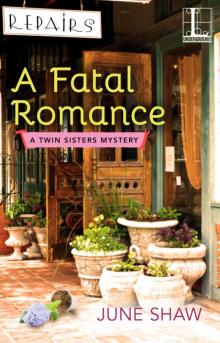 A Fatal Romance
A Fatal Romance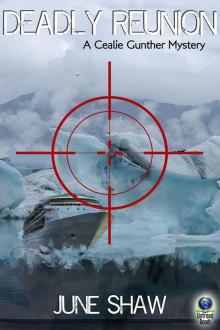 Deadly Reunion
Deadly Reunion A Manor of Murder
A Manor of Murder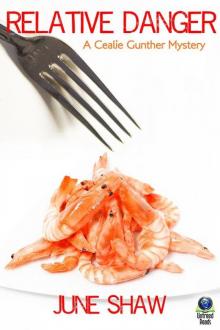 Relative Danger
Relative Danger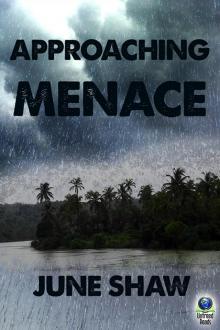 Approaching Menace
Approaching Menace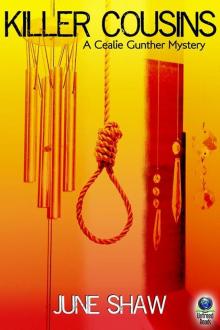 Killer Cousins
Killer Cousins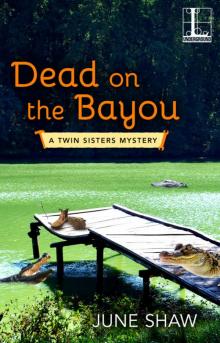 Dead On the Bayou
Dead On the Bayou